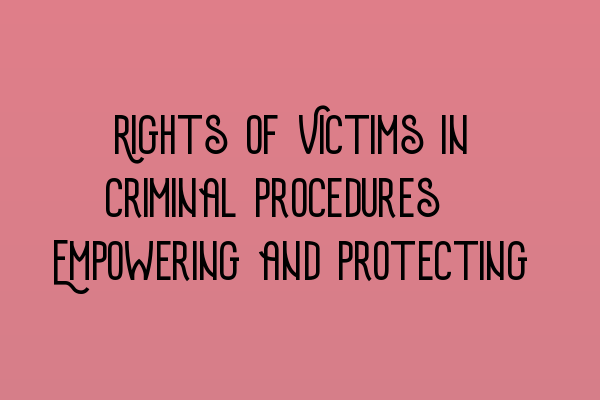Rights of Victims in Criminal Procedures: Empowering and Protecting
When discussing criminal procedures, it is crucial to highlight the rights of victims. They play a significant role in the justice system and must be empowered and protected throughout the entire process. In this article, we will explore the various rights afforded to victims in criminal procedures, aiming to provide a comprehensive understanding of their importance.
1. Right to be Informed
One of the fundamental rights of victims is the right to be informed. They have the right to receive timely and accurate information about the progress of their case, including any significant developments, court dates, and the overall outcome of the proceedings. Being informed allows victims to actively participate in the legal process and make informed decisions regarding their involvement.
If you are preparing for the SQE Criminal Law & Practice Law exam, it is essential to familiarize yourself with the specific legislation in place to safeguard the rights of victims. This knowledge will not only help you succeed in the exam but also equip you with the necessary understanding to advocate for victims in real-life scenarios.
2. Right to Be Heard
Victims have the right to be heard in criminal procedures. This means that they have the opportunity to express their views and concerns before relevant authorities, such as law enforcement officers, prosecutors, and judges. Allowing victims to be heard ensures that their voices are taken into consideration when making decisions regarding the case.
If you are studying for the SQE Criminal Law & Practice Law exam, it is vital to understand the different methods through which victims can exercise their right to be heard. Familiarize yourself with the appropriate procedures for victim impact statements, witness statements, and providing feedback throughout the legal process.
3. Right to Protection
Protection is another crucial aspect of the rights of victims. Victims should be protected from any potential harm or intimidation that may arise as a result of their involvement in the criminal proceedings. This protection extends to physical safety, emotional well-being, and privacy.
As future legal practitioners, it is essential to know the measures available to protect victims during criminal procedures. Understanding restraining orders, providing assistance for vulnerable victims, and ensuring safe environments for testimonies are all integral components of safeguarding victims’ rights.
4. Right to Compensation and Restitution
In some cases, victims have the right to compensation and restitution. Compensation aims to provide financial assistance to victims who have suffered physical, emotional, or financial harm as a result of the criminal act. Restitution, on the other hand, involves the offender being required to repay or provide services to the victim to rectify the harm caused.
When studying for the SQE Criminal Law & Practice Law exam, make sure to familiarize yourself with the relevant legislation concerning victim compensation and restitution. Knowing how to navigate these legal provisions will not only benefit your exam preparation but also allow you to provide valuable support and advice to victims in need.
5. Right to Participation
Lastly, victims have the right to participate in criminal procedures. This includes the ability to attend court hearings, contribute to the case through providing evidence, and being involved in decisions related to bail or sentencing. By empowering victims to actively participate, we promote transparency and accountability within the justice system.
As an aspiring SQE Criminal Law & Practice Law professional, it is crucial to understand the different avenues through which victims can exercise their right to participation. Familiarize yourself with the procedures for witness testimony, victim impact statements, and the various stages of a hearing to effectively advocate for your clients.
In conclusion, the rights of victims in criminal procedures are essential for empowering and protecting those who have suffered as a result of criminal acts. As legal professionals, it is crucial to understand the legislation and procedures in place to ensure these rights are upheld. By doing so, we can contribute to a justice system that is fair, transparent, and supportive for all parties involved.
If you would like to delve deeper into the SQE Criminal Law & Practice Law topics and enhance your exam preparation, we recommend exploring our related articles:
